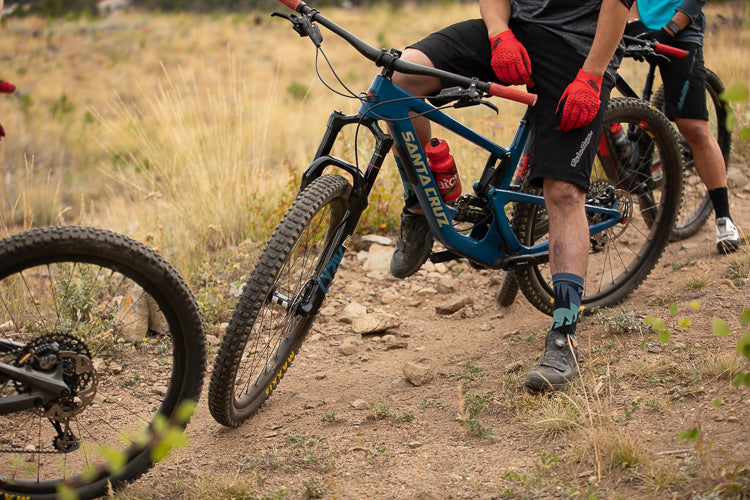If you want to start some drama at the trailhead, just ask a group of mountain bikers if you should buy carbon wheels. The aluminum faithful call carbon wheels a waste of money. Carbon converts preach about pure performance. Somewhere in between is the truth.
In road cycling, factors like stiffness, weight, and aerodynamics make carbon wheels the clear choice for performance. But mountain biking is more complicated. Rocks, roots, and other trail features mean there is a much higher potential of damaging rims.

What wheels are you running?
There are plenty of jokes, horror stories, and myths about carbon wheel failures, and that can instill doubt in a lot of riders’ minds. But in the last 10 years, carbon technology has matured. Though not perfect, modern carbon wheels are more reliable than ever. More mountain bike manufacturers are including carbon wheels as standard equipment. And the industry has made a huge push to introduce generous carbon wheel warranties. Just look at bikes out on popular trails and you'll see that carbon wheels are more popular than ever.
But will carbon mountain bike wheels be worth it for you? Read on to find out more about the advantages and disadvantages of carbon wheels, and what experienced riders at The Pro’s Closet have to say on the subject.
[button]Shop MTB wheels[/button]
Carbon MTB Wheels: The Pros & Cons
Pros
- Lower weight
- Greater stiffness
- Carbon rims tend to stay truer
- Carbon rims can generally survive impacts that dent, deform, or flat-spot aluminum rims
- Good warranties (if purchased new) can actually make them a good value
Cons
- Higher initial cost
- Carbon's failure mode is more catastrophic (the rim will crack/break instead of denting/deforming)
- Regular riders likely won't notice huge performance gains
Weight: Carbon MTB Wheels Are (Often) Lighter

With lightweight carbon wheels my old Niner AIR9 RDO weighed less than 20 lbs (without pedals or cages) and felt like a rocketship on climbs.
Carbon fiber possesses a very high strength-to-weight ratio. It has almost half the density of aluminum; it’s more than five times less dense than steel, but it is stronger than either metal. This is especially important for bicycle wheels.
Wheels (and tires) make up rotating weight on your bike. Increased rotating weight increases inertia and wheel inertia matters in cycling because the rider has to use energy to overcome it and accelerate. Heavier wheels require more energy and lighter wheels require less.
[newsletter]
Lightweight carbon wheels make a bike feel snappy and easier to get up to speed. They can help you climb faster and save energy on long rides. Naturally, carbon wheels enjoy widespread use in high-level XC racing where riders are focused on saving weight to maximize performance.
As we’ve discussed previously in our “Does bike weight matter” article, wheels are the best place to cut weight on a bike. Many riders, even novices, can actually feel the difference when riding lighter wheels. Reducing an equivalent amount of weight elsewhere on the bike is much less noticeable.

To show how much lighter carbon wheels are, let’s look at two wheelsets in our inventory: the aluminum DT Swiss XM1501 Spline One 25 and the carbon DT Swiss XRC1200 Spline 25. (At TPC, we weigh every bike and component we sell on our scales so I'm using real-world rather than claimed weights.)
I chose these wheels because they come as standard equipment on several XC mountain bikes, and they feature rims with the same diameter (29”) and internal width (25mm), the same lightweight DT Swiss 240s hubs, and the same spoke count (the XRC1200 uses slightly lighter spokes, but it only accounts for a few grams). The only part of the wheels that will significantly affect the overall weight is the rim material.
On our scales, the aluminum wheel weighs 1,700g while the carbon wheel weighs 1,390g. This is a difference of 310g or .68 pounds. In cycling, anything over half a pound is significant, especially when the weight is located at the rim. When you’re pedaling and spinning a wheel thousands of times in a single ride, it will add up. If you’re looking to maximize your performance on climbs, a lighter carbon wheel is a solid upgrade over a basic alloy wheel.
[button]Shop MTB wheels[/button]
Stiffness: Carbon MTB Wheels Are Way Stiffer, but Can Still Be Compliant

Stiffer wheels are great for railing turns.
Well-built aluminum wheels can be built to be Stiff, but when compared to similar carbon wheels they don’t come close. Stiff wheels are desirable because they:
- Respond faster to pedaling and acceleration
- Make steering feel sharper and more controllable
- Make the bike feel more “lively” and responsive
- Track better when aggressively leaning the bike over and cornering
- Help you maintain speed as less energy is lost to wheel flex
- Deflect predictably off obstacles
Stiffer wheels can increase the feeling of control, which can increase both your confidence and perception of speed. For me, I just enjoy the feel. As a heavier rider (190-200 pounds), I can notice flex in some aluminum wheels. Carbon wheels generally feel more "zingy," especially pumping hard out of corners, and I like that.
Of course, it is possible for wheels to be too stiff. Some older carbon wheels were criticized for having a punishingly harsh ride. In fact, some riders still choose aluminum wheels because the increased flex is sometimes more comfortable. Fortunately, ride quality has become a bigger priority for modern carbon wheel designs.
The video above shows a Stan's NoTubes carbon Bravo rim designed to deflect up to 10mm during impacts. The Bravo was one of the first carbon wheels to prioritize compliance and it is a great demonstration. It's also an old (and discontinued) wheel, which is cool because many newer carbon wheels are just as good or better.
Compliance has become a major buzzword in carbon fiber bike products. This is because carbon can be engineered to act differently in different directions. This allows engineers to design wheels that are rigid in a specific direction, while still compliant in another direction.
The key to combining high performance with good ride quality is combining lateral stiffness and vertical compliance. Carbon rims allow you to maintain all the performance benefits of a stiff wheel while providing more shock absorption for a more pleasant ride. Most modern carbon wheels absorb shocks and vibrations so well that they match or exceed the ride quality of aluminum wheels.
Cost: Yes, Carbon MTB Wheels Will Cost (A Lot) More
Cost scares away most carbon curious wheel buyers. Let’s look at the two high-end DT Swiss wheelsets we compared earlier. The retail price is $1,200 for the aluminum XM1501 Spline One 25 wheelset and $2,130 for the carbon XRC1200 Spline 25 wheelset. That is nearly a $1,000 difference.
In general, it’s common for carbon wheels to retail for around double their aluminum competitors. If you’re buying a new set of carbon wheels expect to spend in the $1,500-2,500 range. High-quality aluminum wheels are often in the $600-1500 range. (Of course, buying pre-owned wheels will save a lot of money.)
Why is carbon so much more expensive? It’s down to the manufacturing process.

Carbon rims need to be hand laid and require skilled labor. | Photo courtesy of ENVE Composites
Aluminum rims are extruded and then welded (or pinned for budget wheels) into a circular shape. Aluminum manufacturing has been refined over decades, and it can be largely automated so manufacturers can produce thousands of rims in a single day. Add in the lower cost of raw materials and aluminum rims are unbeatable in terms of price.
Carbon rim manufacturing, on the other hand, is more labor-intensive, and the tooling and raw materials are more expensive. Creating any carbon cycling component requires molds. The molds themselves are costly, and carbon sheets need to be laid into the molds by hand in a specific order. This requires skilled labor and it means production numbers are much lower. All this needs to be done in a climate-controlled environment, adding even more to the cost.
Unfortunately, with carbon, you have to pay to play. For some riders, especially those on a budget or who are hard on wheels, it may not be worth the high cost.
But Don't Forget About Carbon Wheel Warranties
If you're buying a brand-new set of carbon wheels, many top brands (Reserve, ENVE, We Are One, etc.) offer generous lifetime warranties and will replace cracked or broken rims at no cost.
If you're the type of hard-charging rider who regularly destroys rims, no matter the material, then spending more upfront on a high-quality carbon rim could actually be a good investment as you likely won't have to pay for future rim replacements.
[button]Shop MTB wheels[/button]
Durability: Carbon MTB Wheels Are Super Tough, but They Can Fail
Beyond cost, durability is the biggest concern most riders have with carbon. It's one of the major cruxes of the carbon vs. aluminum debate. Surf the comment section of popular mountain bike websites and you’ll find plenty of commenters who like to dismiss carbon rims as too fragile.
As stated above, carbon has a very high strength-to-weight ratio. In theory, a carbon wheel should be stronger than an aluminum wheel, especially if they’re built to be similar in weight. But the reality is that many riders have experienced carbon rim failures and this has colored people’s opinions.
Above is a video showing a wheel failure I experienced. A sharp rock at the bottom of this wallride instantly put a crack in my rim. It was fast, fairly unspectacular, and completely unexpected. Fortunately, my rim was still able to hold air and I was able to ride out. ENVE did warranty my rim.
Aluminum and carbon will both fail under the right conditions but their failures are different. Aluminum will usually dent, deform, or flat-spot. Carbon will usually develop a crack which makes it unsafe to ride. It is simply the nature of the material.
Some riders prefer aluminum because dents can potentially be repaired and if an aluminum rim does fail, it’s much cheaper to replace. Bending dents back is easy, but in my experience, it’s often better to leave minor dents alone if the tubeless seal isn’t compromised. Sharp and heavy dents that prevent a proper tubeless seal usually indicate that the rim should be replaced. Bending back a dented aluminum rim will also compromise its strength.

If your riding style or trails are likely to damage rims, carbon might not be for you. | Photo courtesy Orbea
Unfortunately, in mountain biking, wheels are one of the components that are the most prone to damage. Wheel damage is especially common for downhill and enduro riders who attack gnarlier trails at high speed. This type of riding generates larger forces that will make rim damage more likely. Aluminum rims are inexpensive enough that many riders can easily accept it as a part of the sport. But the high cost of a carbon rim can turn people sour when they experience a similar failure.
As a general piece of advice, you should ride wheels that you can afford to replace. For many, that means aluminum. Some manufacturers, however, are introducing generous carbon rim warranties that offer easy, no-questions-asked rim replacement for the original owner. This benefit has the potential to offset the initial cost of a carbon wheelset.
Keep in mind there are also plenty of riders out there that have never experienced a rim failure. If you ride smooth and smart, and use proper tire pressures or a protective insert (see below), there’s a good chance you’ll avoid major issues.
Tire Inserts Could Help Protect Carbon Wheels
There is one piece of technology, however, that is making carbon more popular — the tire insert. Tire inserts provide extra rim protection by placing foam between the rim and trail obstacles. They do add weight, but they allow you to worry less about rim failures while enjoying the stiffness of carbon wheels. (To learn more, check out our article “What are tire inserts? Do you need them?”)
Carbon MTB Wheels vs. Aluminum MTB Wheels: What do riders think?
Our employees love cycling, obsess over bikes and tech, and have access to a huge selection of products. They are all knowledgeable and opinionated so I polled the mountain bikers in our shop to see whether they preferred carbon or aluminum wheels. We had over 60 respondents to this poll and many explained why they would pick one over the other.
The chart below shows the overall results:

When asked which wheel material they would buy with their own money, the results were evenly split between carbon and aluminum, with carbon having a slight edge. The majority of those who selected aluminum were downhill-focused riders who are hard on equipment. As a bonus, I also asked which wheel material our riders would choose if given wheels for free. In this hypothetical scenario, our riders overwhelmingly preferred carbon.
Riders who like aluminum wheels:
- Are concerned with cost
- Tend to destroy multiple rims in a season
- Enjoy riding far from civilization
- Still feel the ride quality of carbon wheels is too harsh
Cost was the biggest factor for riders who choose aluminum. A few hard-hitting riders mentioned they go through multiple rims a year and replacement aluminum rims are significantly cheaper. A couple of riders enjoy doing backcountry excursions, far from civilization. In the event of catastrophic rim failure, an aluminum rim has a better chance of being bent back into shape and ridden to safety. You can’t fix a cracked carbon rim out on the trail. Only one rider said that carbon wheels feel too harsh.
Riders who like carbon wheels:
- Seek performance gains
- Look to shed weight off the bike
- Want to true wheels less often
- Hate denting wheels
- Have experienced no prior carbon failures
Those who preferred carbon wheels seemed more performance-focused. Many said the stiffer feel of carbon was the most attractive benefit. A couple of respondents also made the interesting point that good carbon wheels rarely go out of true due to their stiffness. Interestingly, just over one-third of respondents said they have never had durability issues with carbon rims. Over half of carbon users also said they use tire inserts with their wheels.
As a final point, I decided to ask an expert skills coach what he thought. Lee McCormack is a world-renowned mountain bike skills author and instructor. He’s the author of the highly popular Mastering Mountain Bike Skills.

Lee attacking rocky trails with carbon wheels. Photo: Yann Ropar
“I run carbon wheels on all of my trail bikes,” McCormack says. “I find them to be lighter, stronger, and nicer-riding than aluminum. Beginners won't likely notice anything but the weight. But the more advanced and in tune you are with your bike, the more you'll appreciate the stiffness, ride quality, and durability.”
Rider Skill Level Considerations
Lee brings up an interesting point with his comment: Many riders might not be able to actually notice all of the performance gains that carbon wheels provide. This doesn't mean newbies should avoid carbon. But you have to be very experienced and in tune with your bike to feel the minute differences in ride quality, handling, and responsiveness.
The Psychological Factor
The psychological benefit or "feel-good factor" of carbon wheels is an aspect that's often overlooked in technical discussions. Earlier, in the stiffness section, I mentioned that I enjoy riding carbon wheels because they feel like they have more "zing." Is that a performance benefit? Probably not. But the mental edge that feeling gives me can boost confidence on the trail, which, in turn, may enhance riding performance. Placebo is powerful, and there are some intangible yet real benefits to using high-performance gear!
Final thoughts
 Racing in Angel Fire on Reserve 30 carbon wheels.
Racing in Angel Fire on Reserve 30 carbon wheels.
Personally, I love carbon wheels. As a rider with some disposable income and less than stellar fitness, I like to use technology like carbon wheels to get every advantage possible. I’m the same way with many hobbies. I like to tune up car motors to achieve maximum horsepower. I like overclocking my computer. I’m the type of person who gravitates toward high-performance gear even if it might have some drawbacks. I’d rather chase performance than compromise. Chances are, if you're considering upgrading to carbon wheels, you think like this too.
Modern Carbon wheels can be extremely reliable. Of course, nothing is foolproof, but I’ve personally had no issues since adding CushCore Pro tire inserts to all of my carbon wheel setups. All of my current bikes use carbon wheels — even my enduro bike which gets worked over at the bike park and in enduro races. Carbon isn't for everyone, and I completely understand why it turns some people off. But for now, I don't see myself going back to aluminum.
[button]Shop MTB wheels[/button]

























